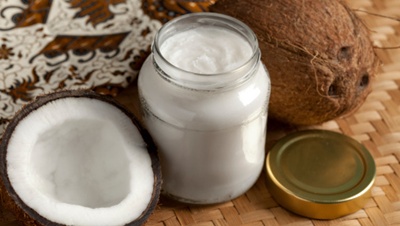
You may have heard it mentioned more and more in casual conversation: Coconut oil. It’s been around for years, but is trending high for its health benefits and as an alternative to cooking oils like canola and olive.
I remember when I was studying nutrition I was taught that the consumption of saturated fat from any source was a bad idea because the common thought was fat could raise LDL cholesterol (commonly referred to as bad cholesterol). This, in turn, would increase the risk of heart disease. In place of the saturated fats from animal sources, the use of plant oils was recommended as a healthier option. Interestingly, the only plant oils that were not recommended were tropical oils from coconuts and palm nuts.
Case for Coconut Oil and Saturated Fat
The reason why we were told to steer clear was because these particular oils were derived from sources that contained high concentrations of saturated fat. Although these oils were from plant sources, they were solid at room temperature and more like butter in consistency.
But new evidence has given us a completely new perspective on the role of saturated fat and the associated development of heart disease.
Although saturated fat can increase LDL cholesterol, it also increases the HDL cholesterol (the good kind) and this can protect you from developing heart disease. The tie between saturated fat and heart disease has been questioned, too.
The newer studies looking at all the risk factors for the development of coronary artery disease and mortality from heart disease have failed to find a link between saturated fat in the blood and heart disease.
In fact, recent evidence has indicated that the fat content in coconut oil and some dairy products (while it is considered to be saturated) may actually be quite good for you!
What Gives Coconut Oil Its Cred
Fatty acids in coconut oil are mostly saturated but the fat molecules are “short molecules.” They are carried on top of other molecules that are called medium-chain triglycerides—which are not damaging to the heart.
These fats are used as an energy source by the liver to feed the muscles of the heart and skeleton. Any excess can be stored for future use by the liver and won’t contribute to accumulated body fat.
On the other hand, longer-chain saturated fatty acids, found in beef and mutton fat, for example, are carried on top of “longer” triglyceride molecules. They get stored in fat cells throughout your body. The liver, in response, makes more cholesterol and triglycerides. Not so good!
Focusing on cholesterol as the main cause of heart disease has increased the profits of the drug companies who continue to make cholesterol-lowering drugs.
It is well understood now that the ingestion of an imbalance of fats (too many plant oils, not enough fish oils), as well as reliance on sugar, calories or refined carbohydrates is much more important when it comes to preventing heart disease.
Keep in mind a few things though: Insulin resistance, abdominal body fat gain and inflammation are also key contributors to heart health.
Use coconut oil in moderation with other fats derived from fish, flax seed, nuts, extra-virgin olive oils and avocado. This will reduce your risk of developing a hardening of your coronary arteries—keeping your heart strong.
Related:
Sources:
Lawrence, G.D., “Dietary fats and health: dietary recommendations in the context of scientific evidence,” Adv Nutr. May 1, 2013; 4(3): 294–302.













